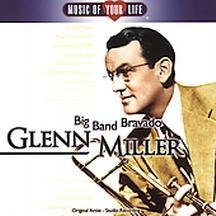| All Artists: Glenn Miller Title: Glenn Miller - Big Band Bravado CD Members Wishing: 0 Total Copies: 0 Label: Sunset Jazz Recordings / Sunset Strategic Marketing (SSM) Release Date: 11/6/2007 Genres: Jazz, Pop Style: Swing Jazz Number of Discs: 1 SwapaCD Credits: 1 UPC: 787364088126 |
Search - Glenn Miller :: Glenn Miller - Big Band Bravado CD
 | Glenn Miller Glenn Miller - Big Band Bravado CD Genres: Jazz, Pop
Glenn Miller's reign as the most popular bandleader in the U.S. came relatively late in his career and was relatively brief, lasting only about three and a half years, from the spring of 1939 to the fall of 1942. But durin... more » |
Larger Image |
CD Details
Synopsis
Product Description
Glenn Miller's reign as the most popular bandleader in the U.S. came relatively late in his career and was relatively brief, lasting only about three and a half years, from the spring of 1939 to the fall of 1942. But during that period he utterly dominated popular music, and over time he has proven the most enduring figure of the swing era, with reissues of his recordings achieving gold record status 40 years after his death. Miller developed a distinctive sound in which a high-pitched clarinet carried the melody, doubled by a saxophone section playing an octave lower, and he used that sound to produce a series of hits that remain definitive examples of swing music. Miller's approach is not much appreciated by jazz fans, who prefer bands that allow for greater improvisation than was found in his highly disciplined, rigorously rehearsed unit. But he brought the swing style of popular music to a level of sophistication and commercial acceptance it had not previously achieved and would not see again after his untimely passing. Miller was the son of Lewis Elmer and Mattie Lou Cavender Miller. He lived in various locations in the Midwest while he was growing up. He first took up the mandolin, then switched to a horn. In Grant City, MO, where his family moved in 1915, he joined the town band and began playing trombone. By 1918, the family had moved to Fort Morgan, CO, where he played in the high school band and graduated in May 1921. He immediately joined the Boyd Senter band, but quit to start college at the University of Colorado in January 1923. After a year, however, he left college and moved to Los Angeles, where he joined Ben Pollack's band. In the summer of 1928, he left Pollack and settled in New York, where he worked as a session musician and arranger. When in the spring of 1934 Tommy and Jimmy Dorsey formed the Dorsey Brothers Orchestra, he signed on as trombonist and arranger, remaining with the band almost a year. He left to organize an American band for British bandleader Ray Noble that made its debut at the Rainbow Room in New York's Rockefeller Center. Meanwhile, he was studying theory and composition with Joseph Schillinger. Miller began recording under his own name for Columbia Records on April 25, 1935, using a pickup band containing members of the Noble orchestra. His instrumental "Solo Hop" reached the Top Ten in the summer of 1935. But he did not organize a permanent touring band of his own until 1937, when he signed to Brunswick Records. The group was not a success, and he disbanded it in early 1938, then reorganized a couple of months later and signed to the discount-priced Bluebird subsidiary of RCA Victor Records. Still without any great success, he managed to maintain this orchestra for the next year until he got his big break with an engagement at the Glen Island Casino in New Rochelle, NY, in the summer of 1939. Glen Island was a major swing venue with a radio wire, giving the band extensive exposure. Already, Miller had hit the charts with the Top Ten hit "Sunrise Serenade"; soon, its flipside, "Moonlight Serenade," would become an even bigger hit. "Wishing (Will Make It So)" (vocal by Ray Eberle) hit number one in June. Ultimately, Miller scored 17 Top Ten hits in 1939, including the subsequent chart-toppers "Stairway to the Stars," "Moon Love," "Over the Rainbow," and "Blue Orchids" (all vocals by Ray Eberle), as well as "The Man With the Mandolin" (vocal by Marion Hutton). Miller's recording success led to other opportunities. He became the star of the three-times-a-week radio series Chesterfield Supper Club in December 1939 and began the first of several extended engagements at the Café Rouge in the Hotel Pennsylvania in New York in January 1940, also appearing occasionally at the Paramount Theatre.

 Track Listings (12) - Disc #1
Track Listings (12) - Disc #1